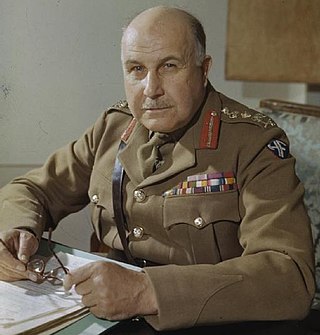
Field Marshal Henry Maitland Wilson, 1st Baron Wilson,, also known as Jumbo Wilson, was a senior British Army officer of the 20th century. He saw active service in the Second Boer War and then during the First World War on the Somme and at Passchendaele. During the Second World War he served as General Officer Commanding-in-Chief (GOC-in-C) British Troops in Egypt, in which role he launched Operation Compass, attacking Italian forces with considerable success, in December 1940. He went on to be Military Governor of Cyrenaica in February 1941, commanding a Commonwealth expeditionary force to Greece in April 1941 and General Officer Commanding (GOC) British Forces in Palestine and Trans-Jordan in May 1941.

General Sir Richard Nugent O'Connor, was a senior British Army officer who fought in both the First and Second World Wars, and commanded the Western Desert Force in the early years of the Second World War. He was the field commander for Operation Compass, in which his forces destroyed a much larger Italian army – a victory which nearly drove the Axis from Africa, and in turn, led Adolf Hitler to send the Afrika Korps under Erwin Rommel to try to reverse the situation. O'Connor was captured by a German reconnaissance patrol during the night of 7 April 1941 and spent over two years in an Italian prisoner of war camp. He eventually escaped after the fall of Mussolini in the autumn of 1943. In 1944 he commanded VIII Corps in the Battle of Normandy and later during Operation Market Garden. In 1945 he was General Officer in Command of the Eastern Command in India and then, in the closing days of British rule in the subcontinent, he headed Northern Command. His final job in the army was Adjutant-General to the Forces in London, in charge of the British Army's administration, personnel and organisation.
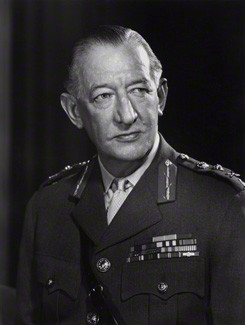
Field Marshal Sir Archibald James Halkett Cassels, was a senior British Army officer who served as Chief of the General Staff (CGS), the professional head of the British Army, from 1965 to 1968. As a young man he was a first-class cricket player, initially playing in India for the Europeans against the Hindus in the Lahore Tournament and going on to play for a Punjab Governor's XI against Northern India team and for a Viceroy's XI against the Roshanara Club. He later played for the British Army cricket team against the RAF at The Oval and then played for the Egyptian national side against HM Martineau's XI in Alexandria.
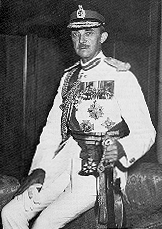
Field Marshal Sir Gerald Walter Robert Templer, was a senior British Army officer. He fought in both the world wars and took part against the Arab Resistance in Palestine. As Chief of the Imperial General Staff, the professional head of the British Army between 1955 and 1958, Templer was Prime Minister Anthony Eden's chief military adviser during the Suez Crisis. He is also credited as a founder of the United Kingdom's National Army Museum.
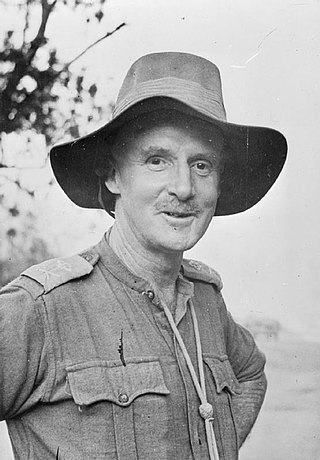
General Sir Frank Walter Messervy, was a British Indian Army officer in the First and Second World Wars. Following its independence, he was the first commander-in-chief of the Pakistan Army from August 1947 to February 1948. Previously, he had served as General Officer Commanding-in-Chief Northern Command, India in 1946 and 1947.
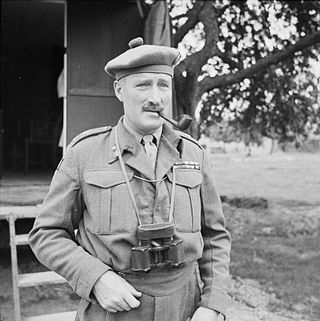
General Sir Neil Methuen Ritchie, was a British Army officer who served in the First and Second World Wars. During the Second World War he commanded the British Eighth Army in the North African campaign from November 1941 until he was dismissed in June 1942 after a disastrous defeat in the Battle of Gazala.

Field Marshal Sir Richard Amyatt Hull, was a senior British Army officer. He was the last Chief of the Imperial General Staff (CIGS), holding the post from 1961 to 1964, and the first Chief of the General Staff (CGS), holding that post until 1965, and, as such, was the professional head of the British Army. He later became Chief of the Defence Staff (CDS) from 1965 to 1967, the professional head of the entire British Armed Forces. He served with distinction during the Second World War, fighting from 1942 to 1945 in North Africa, Italy and Western Europe, became the youngest divisional commander in the British Army, and, after the war was over, he advised the British government on the response to the Indonesia–Malaysia confrontation in the 1960s.
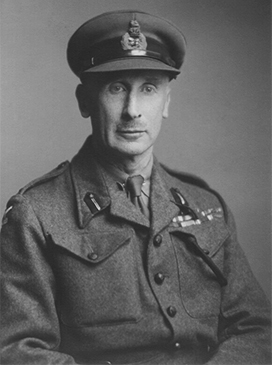
General Sir Evelyn Hugh Barker, was a British Army officer who saw service in both the First World War and the Second World War. During the latter, he commanded the 10th Brigade during the Battle of France in 1940, the 49th Infantry Division and the VIII Corps in the Western Europe Campaign from 1944 to 1945.
General Sir Alfred Reade Godwin-Austen, was a British Army officer who served during the First and the Second World Wars.
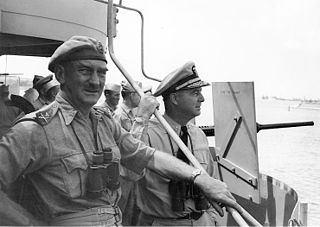
Lieutenant-General Sir John Ledlie Inglis Hawkesworth, was a senior British Army officer who served during both World Wars. During the Second World War he commanded the 4th Division during the Tunisian Campaign in early 1943, later commanding the 46th Division throughout most of the Italian Campaign and, finally, X Corps in Greece, before suffering from a fatal heart attack in June 1945.
Lieutenant General Sir Geoffrey Charles Evans was a senior British Army officer during World War II and the post-war era. He was highly regarded as both a staff and field officer and had the distinction of being awarded the Distinguished Service Order (DSO) on three separate occasions.
Major General Sir Rohan Delacombe, was a senior British Army officer. After he retired from the army, he was the last British-born Governor of Victoria, Australia from 1963 to 1974.
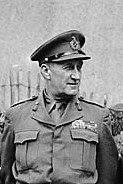
General Sir Lashmer Gordon Whistler,, known as "Bolo", was a British Army officer who served in both the world wars. A junior officer during the First World War, during the Second World War he achieved senior rank serving with Field Marshal Sir Bernard Montgomery in North Africa and North-western Europe from 1942 to 1945. Montgomery considered that Whistler "was about the best infantry brigade commander I knew". In peacetime, his outstanding powers of leadership were shown in a series of roles in the decolonisation process, and he reached the four-star rank of a full general, without having attended the Staff College, Camberley, then considered almost essential for an officer wishing to attain high rank, and which a significant majority of the British generals of the war had attended. This, in Richard Mead's words, was, "proof that lacking a Staff College qualification was no barrier to advancement for the right man."

General Sir Gordon Holmes Alexander MacMillan of MacMillan and Knap, was a Scottish professional soldier who rose to become a general in the British Army. As a young officer during the First World War, he displayed outstanding bravery and was awarded a Military Cross and two Bars. At the age of 19 and while still a second lieutenant, he was appointed acting adjutant of the 2nd Battalion, Argyll and Sutherland Highlanders. Between the World Wars, MacMillan remained in the army, occupying posts of increasing seniority. He married Marian Blakiston Houston in 1929, and they had one daughter and four sons.
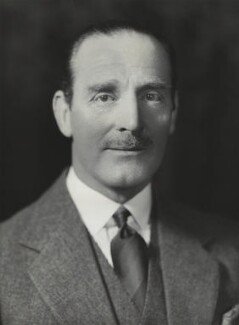
Lieutenant-General Sir Thomas Ralph Eastwood, was a senior British Army officer who notably served as Governor of Gibraltar towards the end of the Second World War.
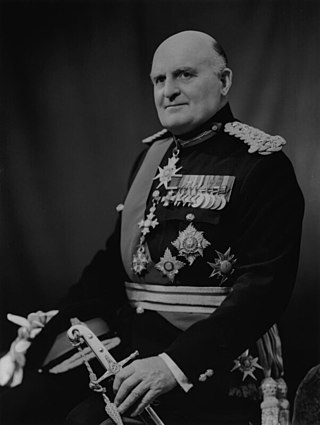
General Sir Horatius Murray, was a senior British Army officer who served with distinction during the Second World War and later in the Korean War.
Lieutenant-General Sir Alexander Galloway, was a senior British Army officer. During the Second World War, he was particularly highly regarded as a staff officer and, as such, had an influential role in the outcome of Operation Crusader during the Western Desert Campaign in late 1941. He later commanded the 4th Indian Infantry Division at the Battle of Monte Cassino during the Italian Campaign in early 1944.
Brigadier Robert Hugh Bellamy & Bar was a senior British Army officer who commanded the 6th Airlanding Brigade during the Rhine Crossing on 24 March 1945 and in the advance across Germany during the Second World War.
Major-General Cyril Ernest Napier Lomax, was an officer in the British Army during the First World War and Second World War. During the latter he commanded the 16th Infantry Brigade in North Africa and the Middle East, and later commanded the 26th Indian Infantry Division in the Burma Campaign, gaining the approval of Field Marshal Sir William Slim.
The following is a timeline of military preparations and engagements during the Suez Crisis.














